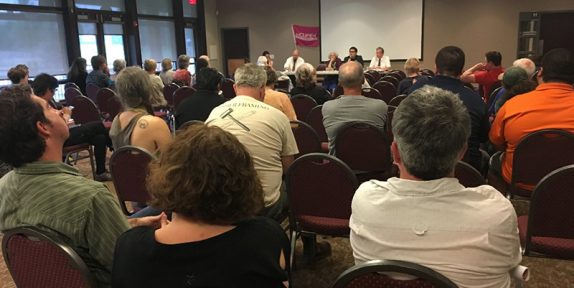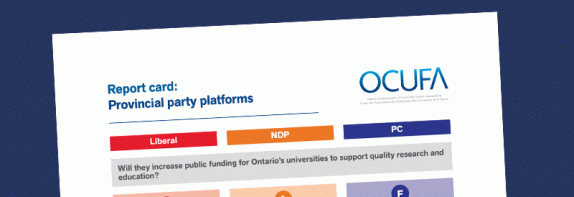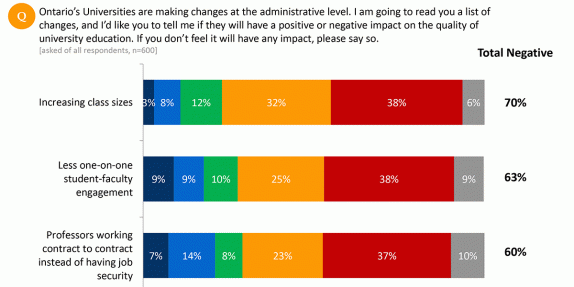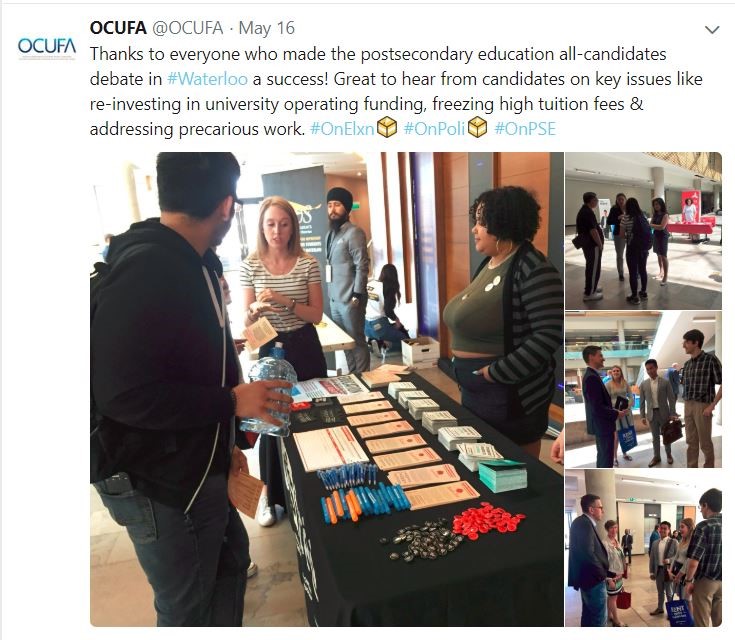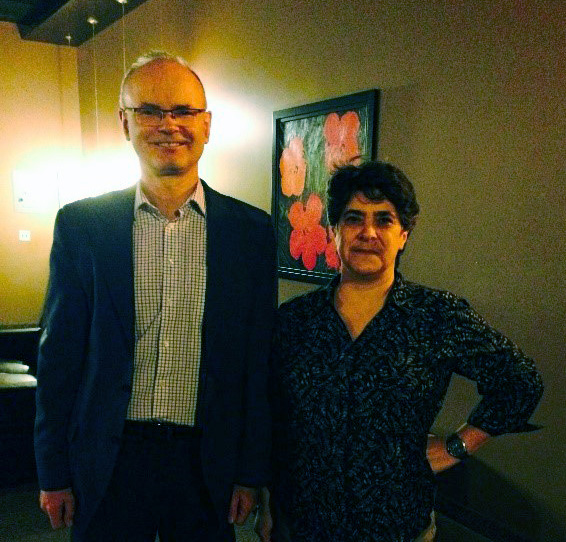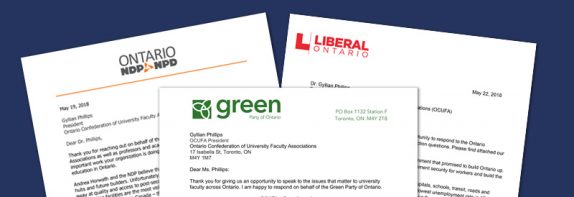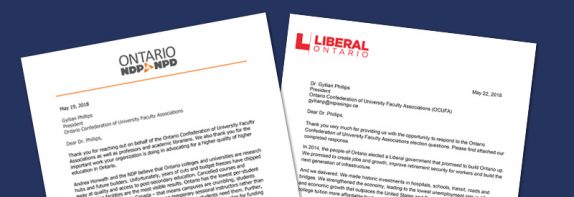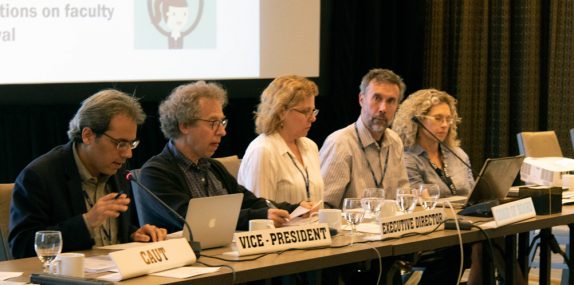
On Saturday, May 12 and Sunday, May 13, OCUFA held its final Board of Directors meeting of the 2017-18 academic year. During the weekend, board members discussed the organization’s current priorities – good jobs and vibrant universities, university funding, and capacity building – with a focus on the postsecondary issues that were likely to receive the most attention in the provincial election. During a special lunchtime reception on the Saturday, board members and colleagues celebrated the winner of OCUFA’s Service Award and the Henry Mandelbaum Graduate Fellowship.
Priorities
OCUFA’s priorities for the 2017-18 academic year were developed to strategically align with those issues most likely to gain traction with the public and political parties in the lead-up to the provincial election. In addition to good jobs and university funding (detailed in OCUFA’s 2018 pre-budget submission), capacity building has been identified as an important means through which OCUFA can support the work of local faculty associations. University governance also continues to be a serious concern.
Good jobs and vibrant universities
One of OCUFA’s established long-term goals is a postsecondary education system where every academic job is a good job with fair compensation, reasonable workloads, access to benefits, and job security. Good jobs are essential for fostering vibrant and dynamic universities. This year, OCUFA has focused on three opportunities for improving the terms and conditions of employment at Ontario’s universities: fairness for contract faculty, faculty renewal, and pensions.
Fairness for contract faculty
In recent years, substantial progress has been made raising awareness about the challenges faced by contract faculty at Ontario universities, and OCUFA hopes to continue building momentum to close gaps in existing labour laws and achieving fairness for contract faculty.
On February 28, faculty, staff, and students from across Ontario participated in OCUFA’s third annual social media day of action in support of fairness for contract faculty and other precariously employed campus workers. Because of our work, the hashtags #Fairness4CF and #15andFairness were trending for much of the day.
OCUFA also participated in this spring’s Fight for $15 and Fairness Provincial Strategy Meeting, which featured many postsecondary stakeholders. Sessions focused on enforcing new equal pay provisions, organizing on campus, and bargaining after Bill 148.
Faculty renewal & panel presentation
In OCUFA’s 2018 pre-budget submission, a faculty renewal strategy was identified as a vital initiative for the government. Ideally, it would support new full-time tenure stream hiring, the replacement of retiring tenured faculty, and create pathways for contract faculty to full-time secure positions. A discussion moderated by Rahul Sapra (OCUFA’s Vice-President) and featuring Gyllian Phillips (OCUFA’s President), Richard Wellen (former President of the York University Faculty Association), Leslie Jermyn (Executive Director of the Queen’s University Faculty Association), and Jeff Tennent (Chair of OCUFA’s Collective Bargaining Committee) reviewed hiring practices at different universities, existing mechanisms for moving contract faculty into the tenure stream positions, the importance of equity when making hiring decisions, and the role of bargaining in determining faculty complement.
Pensions
For several years, OCUFA has worked with sector stakeholders on an initiative to build a new voluntary jointly sponsored pension plan (JSPP) for Ontario’s universities. The University of Toronto Faculty Association, Queen’s University Faculty Association, and University of Guelph Faculty Association have been working to finalize a JSPP intended to provide a secure and sustainable pension option for interested university faculty associations and staff unions in the province. As the pension environment shifts, OCUFA will continue to organize workshops and meetings to help all member associations reach their pension-related goals and expand their capacity to communicate pension issues at the local level.
University funding
OCUFA has held a long-standing goal of increasing public funding for universities to support high-quality postsecondary education in Ontario. Unfortunately, investment in Ontario’s universities has stagnated in recent years and there was no additional operating funding provided in this year’s budget. This remains a serious concern for OCUFA, and our hope is that the next government will make substantive new investments in postsecondary education to help Ontario close the funding gap with the rest of the country.
The provincial government continues to move forward with its efforts to update the university funding formula. However, it is doing so without any meaningful consultation with Ontario’s faculty. The government’s intent to tie university funding to performance according to a series of metrics is of great concern. OCUFA is focused on pushing back against this move towards performance-based funding and advocating for more substantive faculty consultation as part of the strategic mandate process through which these metrics and targets are being negotiated.
Capacity building
Ontario’s university faculty face serious challenges in their workplaces, including too few faculty to do the work, and too many precarious jobs at underfunded universities. OCUFA continues to support member associations with capacity building strategies that can be leveraged to build stronger unions and a university labour movement able to more effectively tackle these problems. Member engagement is an ongoing process and this year’s election has provided many excellent opportunities for faculty associations to engage their members and work with other campus groups to organize all-candidates debates that raise awareness of postsecondary issues.

Update on 2018 provincial election advocacy
The meeting featured a detailed update on OCUFA’s election work advocating for increased public university funding and good jobs for all academic workers. The discussion included a presentation on the results of OCUFA’s public opinion poll on precarious employment on university campuses and its perceived impacts on education quality, and the publicity tour OCUFA conducted to promote the poll results across Ontario.
Meeting participants were updated on faculty-organized advocacy events, including OCUFA’s annual advocacy day and social media day of action, and the many election events being organized by faculty associations across Ontario, including events hosted by the Wilfrid Laurier University Faculty Association, the Faculty Association at the University of Waterloo, the Lakehead University Faculty Association, the University of Ontario Institute of Technology Faculty Association, the McMaster University Faculty Association, and the Trent University Faculty Association.
Updates were also provided about the election resources being produced for OCUFA’s website, including party platform analyses, questionnaires on postsecondary issues, and the party platform report card.
Following the discussion of OCUFA’s election work, Greg Lyle, President of Innovative Research Inc., provided a comprehensive presentation of new poll results and what they could mean for the dynamics of the provincial election campaign and its possible outcomes.
Creation of Investigative Journalism Fellowship and Grievance Award
At the Board Meeting, members voted to create two new awards: one that will encourage additional investigative journalism focused on postsecondary issues, and another to recognize the work of those who defend faculty rights through the grievance process.
The annual OCUFA/Academic Matters Investigative Journalism in Higher Education Fellowship will seek to encourage in-depth reporting about new developments in postsecondary education. Available to full-time, freelance, and student journalists, each year the fellowship will provide financial support for a project of merit that will explore important or underreported developments in higher education.
The new Grievance Award will recognize the contributions of faculty and faculty association staff who have made remarkable efforts to uphold their union’s collective agreement and defend the rights of professors and academic librarians at their institution. The award will be given on a biennial basis.
OCUFA executive elections
During the meeting, the OCUFA Board of Directors elected the organization’s executive for the 2018-19 academic year.
As of July 1, the new executive will be comprised of:
President:
Gyllian Phillips (Nipissing University Faculty Association)
Vice-President:
Rahul Sapra (Ryerson Faculty Association)
Treasurer:
Ann Bigelow (University of Western Ontario Faculty Association)
Members-at-large:
Diane Beauchemin (Queen’s University Faculty Association)
Glen Copplestone (King’s University College Faculty Association)
Sue Wurtele (Trent University Faculty Association)
Chair of the Board:
Kate Lawson (Faculty Association of the University of Waterloo)
Celebration of 2018 recipients of OCUFA Service Award and Henry Mandelbaum Graduate Fellowship
Finally, a special luncheon ceremony during the meeting celebrated the recipients of the 2018 OCUFA Service Awards and Henry Mandelbaum Graduate Fellowship for Excellence in Social Sciences, Humanities, or Arts.
Wilfrid Laurier University Professor Judy Bates and Laurentian University Professor Jean-Charles Cachon were honoured with OCUFA Service Awards for their work strengthening OCUFA and advancing the interests of professors and academic librarians across the province. Queen’s University PhD student Galen Watts was recognized with a Henry Mandelbaum Fellowship for his excellence is scholarship and community engagement.
The luncheon concluded with a special presentation from 2017 Mandelbaum Fellowship winner Laura Jane Brubacher. Laura shared her work studying the challenges faced by pregnant Inuit women who are removed from their families, are forced to travel large distances, and spend months living in boarding houses before giving birth in southern hospitals.
The next OCUFA Board of Directors meeting will be held October 20-21, 2018.









